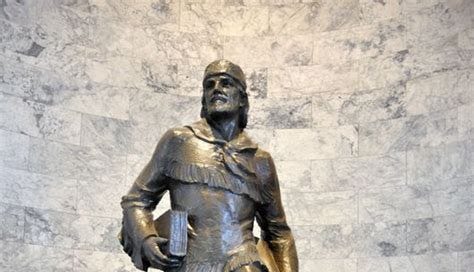Civilization follows the gospel to Oregon
Indians travel 3000 miles in search of Book to Heaven
From Bill Federer, American Minute
In 1831, three Nez Perce Indians and one Flathead Indian, traveled from the Oregon Territory to St. Louis, Missouri, looking for the "book to heaven."
The Bishop of St. Louis was Rev. Joseph Rosati (1789-1843), who later sent Pierre De Smet as one of the "Black robe" missionaries to the Indians.
Bishop Rosati wrote in annals of the Association of the Propagation of the Faith, December 31, 1831:
"Some three months ago four Indians who live across the Rocky Mountains near the Columbia River (Clark's Fork of the Columbia) arrived at St. Louis.
After visiting General Clark who, in his celebrated travels, has visited their country...they came to see our church and appeared to be exceedingly well pleased with it...
Two of our priests visited them...
They made the sign of the Cross and other signs which appeared to have some relation to baptism. The sacrament was administered to them."
Wyandot Indian chief, William Walker (1800-1874), met the same Indians at the home of Territorial Governor William Clark, of the Lewis and Clark Expedition (1805-1806).
His account was printed, March 1, 1833, in the Christian Advocate & Journal and Zion's Herald of New York, a Methodist Episcopal publication which at the time had the largest circulation of any periodical in the world:
"Immediately after we landed in St. Louis, on our way to the west, I proceeded to Gen. Clark's, superintendent of Indian affairs...
While in his office...he informed me that three chiefs from the Flat-Head nation were in his house, and were quite sick, and that one (the fourth) had died a few days ago.
They were from the west of the Rocky Mountains.
Curiosity prompted me to step into the adjoining room to see them, having never seen any, but often heard of them. I was struck by their appearance...
The distance they had traveled on foot was nearly three thousand miles to see Gen. Clarke, their great father, as they called him, he being the first American officer they ever became acquainted with..."
William Walker continued:
"Gen. C. related to me the object of their mission, and, my dear friend, it is impossible for me to describe to you my feelings while listening to his narrative...
(They had heard) the white people away toward the rising of the sun had been put in possession of the true mode of worshiping the great Spirit. They had a book containing directions how to conduct themselves in order to enjoy his favor and hold converse with him;
and with this guide, no one need go astray, but every one that would follow the directions laid down there, could enjoy, in this life, his favor; and after death would be received into the country where the great Spirit resides, and live for ever with him.
Upon receiving this information, they called a national council to take this subject into consideration...
They accordingly deputed four of their chiefs to proceed to St. Louis to see their great father, Gen. Clarke, to inquire of him..."
William Walker wrote further:
"They arrived at St. Louis, and presented themselves to Gen. C. the latter was somewhat puzzled being sensible of the responsibility that rested on him; he however proceeded by informing them that what they had been told by the white man in their own country, was true.
Then went into a succinct history of man, from his creation down to the advent of the Saviour; explained to them all the moral precepts contained in the Bible, expounded to them the decalogue.
Informed them of the advent of the Saviour, his life, precepts, his death, resurrection, ascension, and the relation he now stands to man as a mediator-that he will judge the world, & c."
The publishing of these accounts inspired Dr. Marcus Whitman and his wife Narcissa to leave Massachusetts and became a missionary to the Indians of Oregon and Washington.
President Warren G. Harding, dedicating the Oregon Trail Monument, July 3, 1923, recounted how Dr. Marcus Whitman traveled, clad in buckskin breeches, fur leggings and moccasins,
"...in the dead of winter 1842, struggled through...blinding storms, 4,000 miles...from Walla Walla...past the Great Salt Lake, to Santa Fe...to St. Louis and finally...to Washington, D.C...It was a race against time.
Public opinion was...that Oregon was not worth claiming...Turning to President Tyler, Whitman added...
'All I ask is that you will not barter away Oregon or allow English interference until I can lead...settlers across the plains.'"
President Warren Harding continued:
"Such was Marcus Whitman, the missionary hero...to plead that the state should acquire...the empire that the churches were gaining for Christianity...
Never in the history of the world has there been a finer example of civilization following Christianity. The missionaries led under the banner of the cross and the settlers moved close behind under the star-spangled symbol of the nation."
The State of Washington placed the statue of Dr. Marcus Whitman in the U.S. Capitol's Statuary Hall. (Top)




